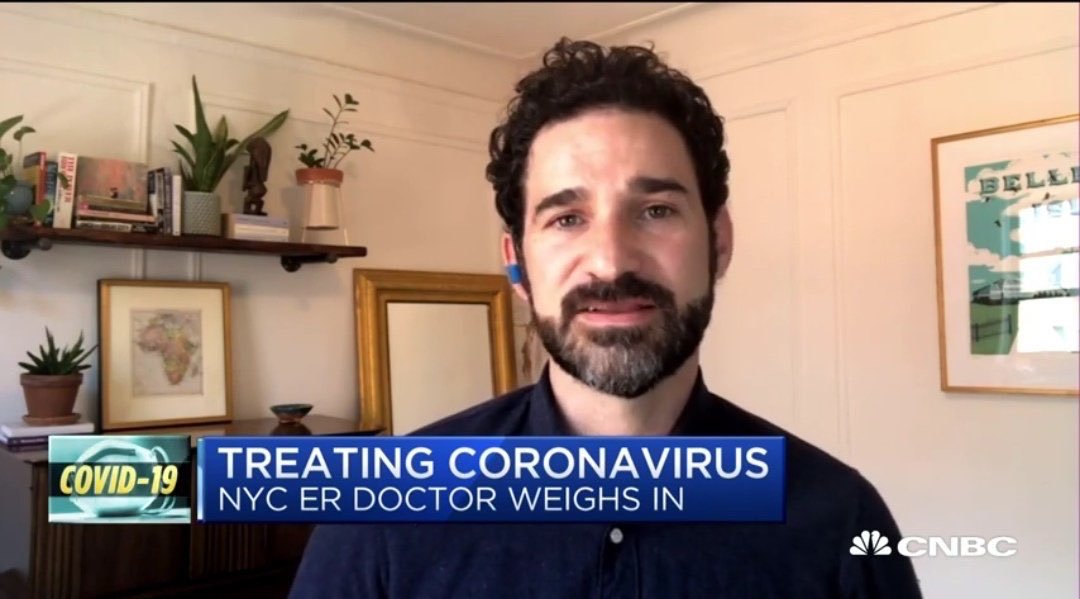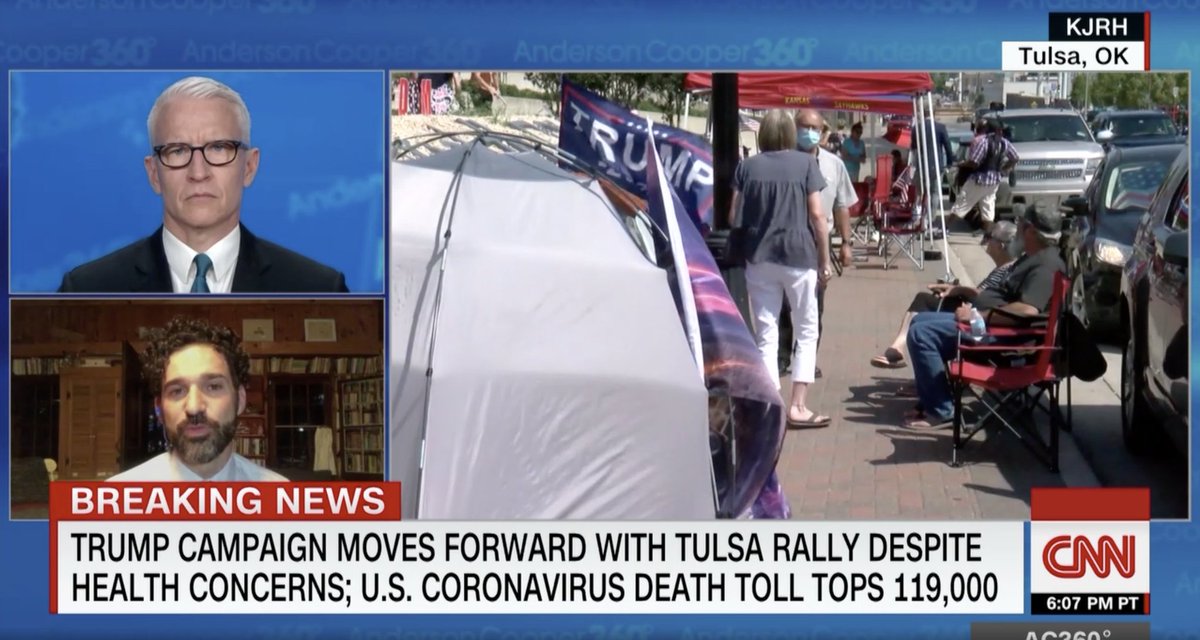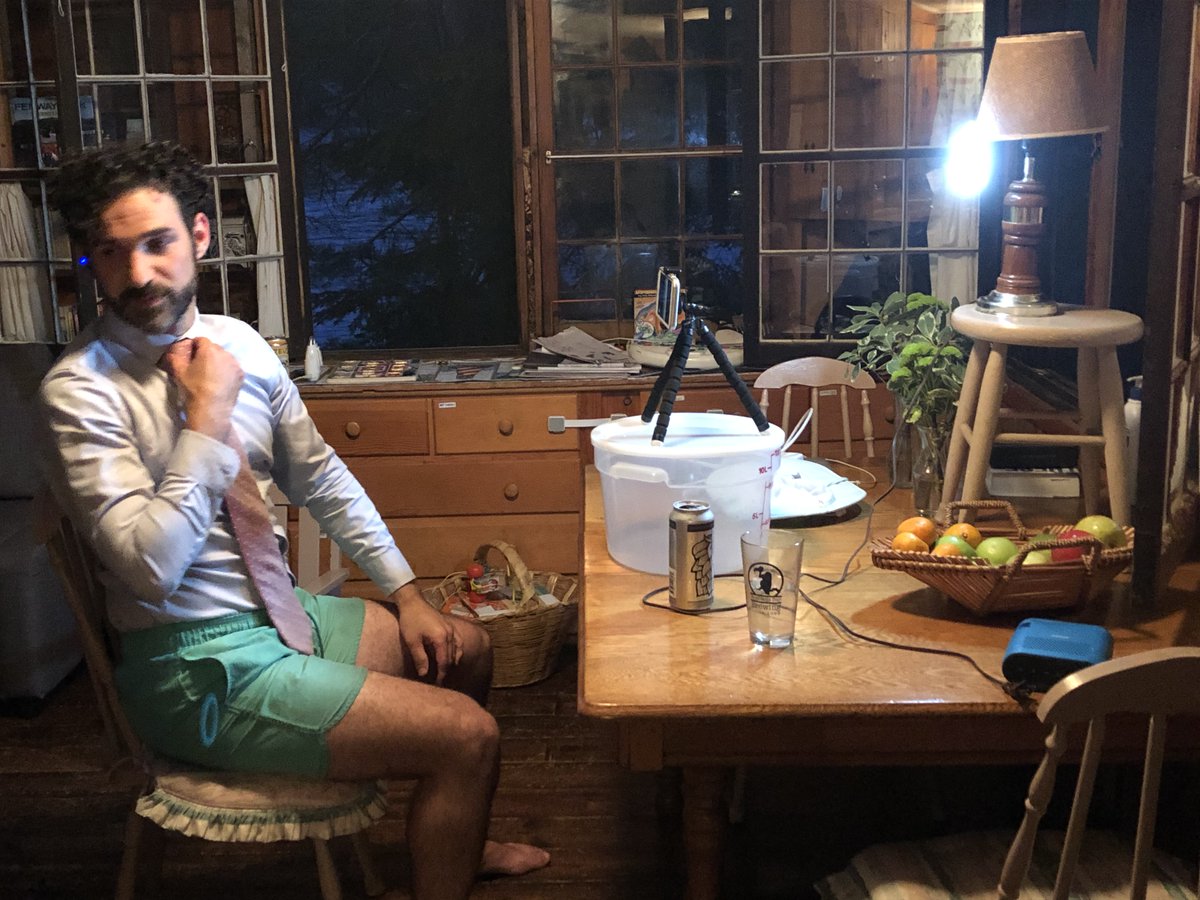"Hey Craig, I just saw you on TV!"
After hundreds of interviews, I hear that often.
And now I forget how unique & foreign being on TV is for most people.
So I thought I& #39;d share what happens behind the scenes to bring experts to your TV/radio to share the latest on #COVID19...
After hundreds of interviews, I hear that often.
And now I forget how unique & foreign being on TV is for most people.
So I thought I& #39;d share what happens behind the scenes to bring experts to your TV/radio to share the latest on #COVID19...
This is my experience. I& #39;m not a regular & #39;contributor& #39; for any network or anything special.
I& #39;m just some guy that commits lots of time to doing media. Because I think it& #39;s one of the best ways to share, educate & make a difference.
To date I& #39;ve made exactly $0.00 from this.
I& #39;m just some guy that commits lots of time to doing media. Because I think it& #39;s one of the best ways to share, educate & make a difference.
To date I& #39;ve made exactly $0.00 from this.
When it comes to being interviewed on TV/radio, most appearances start with a pitch.
A booking producer reaches out, generally via email, to ask you to join a specific show.
The best go like this...
A booking producer reaches out, generally via email, to ask you to join a specific show.
The best go like this...
"I wanted to see if Dr. Spencer might be available to join [program] to discuss [topic] on [date]? The hit would be at [time]."
& #39;Hit& #39; means the actual appearance, and most are live.
& #39;Hit& #39; means the actual appearance, and most are live.
Usually the producer will propose certain topics they want you to cover: something you wrote, a specific research article, etc.
But some will ask you what you think is important to highlight and talk about.
They all love if you share these & #39;talking points& #39; before the show.
But some will ask you what you think is important to highlight and talk about.
They all love if you share these & #39;talking points& #39; before the show.
When I get these requests, I first ask whether I& #39;m the best person to talk about this topic. Is it addressing something I said or wrote? If yes [and I& #39;m free], I& #39;ll try to do it.
If not, I think if there are others who might be better than me, and share their names/contact info.
If not, I think if there are others who might be better than me, and share their names/contact info.
Also, for me, I try to mix up the networks/shows I go on. I want to talk to as many people as possible, all across the political spectrum.
One day I was on @democracynow in the am, @foxnews in the afternoon and @CNN in the evening.
So I take that into account before confirming.
One day I was on @democracynow in the am, @foxnews in the afternoon and @CNN in the evening.
So I take that into account before confirming.
After confirming, there is usually about a 90% chance it& #39;ll actually happen.
News cycles are crazy, press conferences push things back, and honestly sometimes you just get cancelled.
The best producers cancel you well in advance (i.e. days before)...not minutes before.
News cycles are crazy, press conferences push things back, and honestly sometimes you just get cancelled.
The best producers cancel you well in advance (i.e. days before)...not minutes before.
Before you go on, it& #39;s important to set up a nice interview space.
Ligthing is key. I failed on this for a long time. I also had some pictures that were tilted. A hot mess.
But now I have a good setup with nice lighting. Only risk is the over-zealous ice cream truck outside https://abs.twimg.com/emoji/v2/... draggable="false" alt="🙂" title="Leicht lächelndes Gesicht" aria-label="Emoji: Leicht lächelndes Gesicht">
https://abs.twimg.com/emoji/v2/... draggable="false" alt="🙂" title="Leicht lächelndes Gesicht" aria-label="Emoji: Leicht lächelndes Gesicht">
Ligthing is key. I failed on this for a long time. I also had some pictures that were tilted. A hot mess.
But now I have a good setup with nice lighting. Only risk is the over-zealous ice cream truck outside
But honestly, the best part is that you can do this from anywhere, as long as you have internet...
Even from a cabin on vacation.
(p.s. yes, I know I need a haircut)
Even from a cabin on vacation.
(p.s. yes, I know I need a haircut)
Usually ~15 minutes before your & #39;hit time& #39;, you will connect with an audiovisual team. Most will call you via Skype, FaceTime, Zoom, Cisco, etc.
They& #39;ll check your audio (& #39;count to 5& #39;), your framing (& #39;tilt your camera down a bit& #39;) and suggest other adjustments.
Then you wait...
They& #39;ll check your audio (& #39;count to 5& #39;), your framing (& #39;tilt your camera down a bit& #39;) and suggest other adjustments.
Then you wait...
The weirdest part is that you& #39;re usually just looking at a black screen. The whole time.
On some networks you see live programming, but that& #39;s rare.
Every few minutes someone will give you an updated time (& #39;3 minutes& #39;) or & #39;right after the break& #39;.
And then & #39;here we go& #39;...
On some networks you see live programming, but that& #39;s rare.
Every few minutes someone will give you an updated time (& #39;3 minutes& #39;) or & #39;right after the break& #39;.
And then & #39;here we go& #39;...
I used to get really nervous for basically all these interviews. Now it& #39;s just exciting.
For me, I always prepare 3 key messages I want to share.
Throughout your whole & #39;hit& #39;, they may ask 2-3 questions. Most last 5-6 minutes at most.
Sounds short? It feels like a LONG time!
For me, I always prepare 3 key messages I want to share.
Throughout your whole & #39;hit& #39;, they may ask 2-3 questions. Most last 5-6 minutes at most.
Sounds short? It feels like a LONG time!
Almost always, they stick to the questions and topics you emailed about. Sometimes they don& #39;t. Or sometimes they actually don& #39;t provide many specifics in the email (& #39;let& #39;s talk about what& #39;s new with COVID& #39;), so its all a surprise.
What that means is you gotta know your stuff!
What that means is you gotta know your stuff!
To do that, many of us doing frequent media interviews, we spend HOURS reading and researching what& #39;s new with COVID.
I check out the data - from multiple different sources - multiple times a day. I read a bunch of articles, research papers, and *gasp* Twitter threads everyday.
I check out the data - from multiple different sources - multiple times a day. I read a bunch of articles, research papers, and *gasp* Twitter threads everyday.
When you do a lot of interviews, you develop relationships with producers.
Sometimes they& #39;ll text and say & #39;we need someone to join in a few hours, are you available?& #39;.
I got a call once to fire up my Skype to join in 5 minutes because someone got sick and couldn& #39;t join.
Sometimes they& #39;ll text and say & #39;we need someone to join in a few hours, are you available?& #39;.
I got a call once to fire up my Skype to join in 5 minutes because someone got sick and couldn& #39;t join.
Regardless, when the interview is over and you& #39;re given a & #39;thank you for your time& #39; and shooed off, you experience a mix of excitement and then an immediate & #39;oh goodness did I say anything I& #39;ll regret!?& #39;
To date, I stand by it all.
To date, I stand by it all.
Usually you& #39;ll get a few emails after each interview.
Depending on what you said (and on what network), some of them honestly are pretty horrible.
But most are really just genuinely nice and appreciative.
Depending on what you said (and on what network), some of them honestly are pretty horrible.
But most are really just genuinely nice and appreciative.
And ultimately, throughout all this, if you& #39;re lucky, the team at @ratemyskyperoom will assess your setup and hopefully not tear you to shreds.
Today I got my first rating, and apparently, I& #39;m solidly average. https://abs.twimg.com/emoji/v2/... draggable="false" alt="🎉" title="Partyknaller" aria-label="Emoji: Partyknaller"> https://twitter.com/ratemyskyperoom/status/1275168120676798466?s=21">https://twitter.com/ratemysky...
https://abs.twimg.com/emoji/v2/... draggable="false" alt="🎉" title="Partyknaller" aria-label="Emoji: Partyknaller"> https://twitter.com/ratemyskyperoom/status/1275168120676798466?s=21">https://twitter.com/ratemysky...
Today I got my first rating, and apparently, I& #39;m solidly average.
I personally am really honored to be able to share my experiences from the #COVID19 frontlines and my perspectives on the ongoing pandemic with such a large audience.
And I know that everyone you see as a guest on these programs feels the same way.
And I know that everyone you see as a guest on these programs feels the same way.

 Read on Twitter
Read on Twitter
 " title="Before you go on, it& #39;s important to set up a nice interview space.Ligthing is key. I failed on this for a long time. I also had some pictures that were tilted. A hot mess.But now I have a good setup with nice lighting. Only risk is the over-zealous ice cream truck outsidehttps://abs.twimg.com/emoji/v2/... draggable="false" alt="🙂" title="Leicht lächelndes Gesicht" aria-label="Emoji: Leicht lächelndes Gesicht">" class="img-responsive" style="max-width:100%;"/>
" title="Before you go on, it& #39;s important to set up a nice interview space.Ligthing is key. I failed on this for a long time. I also had some pictures that were tilted. A hot mess.But now I have a good setup with nice lighting. Only risk is the over-zealous ice cream truck outsidehttps://abs.twimg.com/emoji/v2/... draggable="false" alt="🙂" title="Leicht lächelndes Gesicht" aria-label="Emoji: Leicht lächelndes Gesicht">" class="img-responsive" style="max-width:100%;"/>




